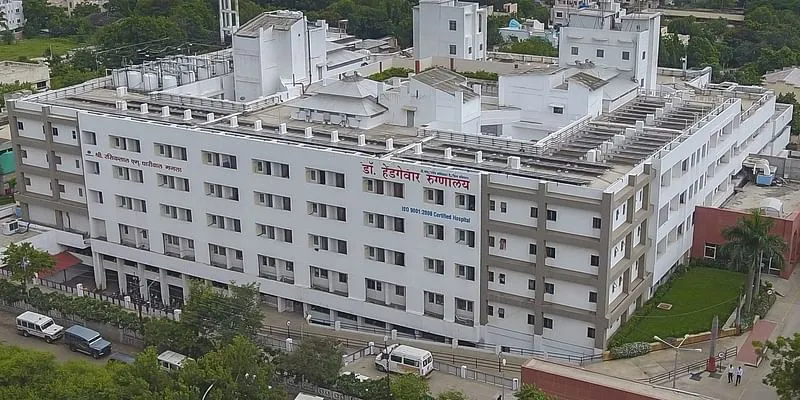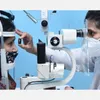This Aurangabad-based foundation has been serving marginalised patients for over 3 decades
Located in different regions of Maharashtra, Dr Babasaheb Ambedkar Vaidyakiya Pratishthan (BAVP) intends to serve everyone equally, irrespective of their economic background.
Back in the 1980s, a group of medical graduates — driven by the Rashtriya Swayamsevak Sangh (RSS) philosophy to make social transformation through public service — started Dr Babasaheb Ambedkar Vaidyakiya Pratishthan (BAVP).
The founders include Dr Satish Kulkarni, Dr Narendra Kulkarni, Dr Bharat Deshmukh, Dr Manjiri Vyavahare, Dr Rajendra Kshirsagar, Dr Jyotsna Kshirsagar, and Dr A D Tupkary.
“We intended to bridge the gap between the have and have nots, privileged and underprivileged. We wanted to create a level playing field for all the citizens, where everyone is treated equally, and to provide excellent, transparent, and compassionate health services to the people of India,” says Dr Anant Pandhare, Medical Director, Dr Hedgewar Hospital.
The charitable trust runs 46 medical and social projects in Maharashtra’s urban, slums, and rural areas, predominantly in Nashik and Aurangabad, which includes a blood bank, health and community centres, mobile health clinics, women and child development programmes, farmer assistance, and animal husbandry.

Dr Hedgewar Hospital
Creating health services
Dr Hedgewar Hospital is one of BAVP’s flagship initiatives. Named after Dr Keshav Baliram Hedgewar, in 1989, a group of self-committed doctors started a 10-bed hospital.
Today, it has become a 300-bed tertiary care multidisciplinary hospital in Aurangabad, which has treated over seven million individuals.
The hospital strives to make high-quality medical services accessible to all at an affordable cost — nearly 60 percent cheaper than other hospitals. The hospital receives funding from donors and through capital investment.
According to Anant, Dr Hedgewar Hospital’s primary beneficiaries are the marginalised. It believes these people — for whom healthcare expenses are a real burden — deserve the highest standard of healthcare.
It provides treatment to every individual coming from 10 nearby districts. The hospital sees over 1,000 patients in the Outpatient Department (OPD) daily.
As per the hospital data, nearly 41 percent of its beneficiaries are people with an annual income below Rs 1 lakh.
Social initiatives
At present, BAVP runs 46 medical and social projects, including two multi-disciplinary hospitals in Aurangabad and Nashik, and an upcoming hospital in Assam for poor patients.
“Considering the diverse Indian community, where ill-health is the manifestation of many social and economic issues, an integrated approach proves to be very effective for the upliftment of the deprived, and the society, as a whole,” says Dr Anant.
The hospital also runs Savitribai Phule Mahila Ekatma Samaj Mandal (SPMESM) — a non-profit organisation that engages in building the livelihoods of the underprivileged by implementing large-scale development interventions.
The trust offers services in the areas of education, community health, natural resources management, women empowerment, and skill development.

Tailoring course under the women empowerment programme
Active in central Maharashtra, the NGO, with its ongoing 42 social initiatives across 270 villages and 68 densely populated slums, is empowering people through entrepreneurship and skill development training programmes.
“Facing challenges wrought by the pandemic, SPMESM’s multiple outposts transformed in the first and the second wave of the pandemic to assist the poor and homeless with free-of-cost medicines, masks, and food. SPMESM’s volunteers also visited villages and slums to raise awareness about the virus and the effectiveness of the COVID-19 vaccine,” says Dr Anant.
Amidst the pandemic, all of BAVP’s hospitals dedicated a large number of beds for COVID-19 treatment. It also completed a dedicated COVID-19 hospital in collaboration with the state government, where it started an initiative to provide free COVID-19 vaccinations to 10,000 industry workers.
Besides providing awareness, counselling, and mask and medicine in slums, SPMESM also offered relief packages, including essential foods, to poor families.
In its journey of nearly three decades, SPMESM partnered with many social organisations and corporates in meaningful ways to carry out social and developmental initiatives.
These organisations include Atlas Copco for rural development, Wipro Foundation for MCH maternal and child health, NSDL for community health, PwC for rural women empowerment, and PRAJ Industries for a watershed project.
Edited by Suman Singh








